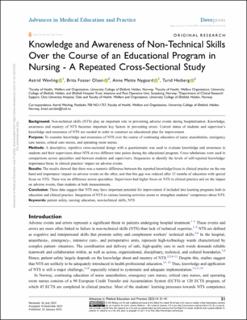| dc.contributor.author | Wevling, Astrid Birgitte | |
| dc.contributor.author | Olsen, Brita Fosser | |
| dc.contributor.author | Nygaard, Anne Mette | |
| dc.contributor.author | Heiberg, Turid | |
| dc.date.accessioned | 2023-08-15T10:44:47Z | |
| dc.date.available | 2023-08-15T10:44:47Z | |
| dc.date.created | 2023-01-20T21:30:46Z | |
| dc.date.issued | 2023 | |
| dc.identifier.citation | Advances in Medical Education and Practice. 2023, 14, 31-41. | en_US |
| dc.identifier.issn | 1179-7258 | |
| dc.identifier.uri | https://hdl.handle.net/11250/3084109 | |
| dc.description.abstract | Background: Non-technical skills (NTS) play an important role in preventing adverse events during hospitalization. Knowledge, awareness and mastery of NTS becomes important key factors in preventing errors. Current status of students and supervisor’s knowledge and awareness of NTS are needed in order to construct an educational plan for improvement. Purpose: To examine knowledge and awareness of NTS over the course of continuing education of nurse anaesthetists, emergency care nurses, critical care nurses, and operating room nurses. Methods: A descriptive, repetitive cross-sectional design with a questionnaire was used to evaluate knowledge and awareness in students and their supervisors about NTS at two different time points during the educational program. Cross tabulations were used in comparisons across specialties and between students and supervisors, frequencies to identify the levels of self-reported knowledge/ importance/focus in clinical practice/ impact on adverse events. Results: The results showed that there was a numeric difference between the reported knowledge/focus in clinical practice on the one hand and importance/ impact on adverse events on the other, and that this gap was reduced after 12 months of education with special focus on NTS. There was no difference across specialties. Supervisors had higher focus on NTS in clinical practice and on the impact on adverse events, than students at both measurements. Conclusion: These data suggest that NTS may have important potential for improvement if included into learning programs both in education and clinical practice. Integration of NTS in various learning activities seems to strengthen students’ competence about NTS. | en_US |
| dc.language.iso | eng | en_US |
| dc.publisher | Dove Medical Press Ltd. | en_US |
| dc.rights | Navngivelse-Ikkekommersiell 4.0 Internasjonal | * |
| dc.rights.uri | http://creativecommons.org/licenses/by-nc/4.0/deed.no | * |
| dc.subject | patient safety | en_US |
| dc.subject | nursing education | en_US |
| dc.subject | non-technical skills | en_US |
| dc.subject | NTS | en_US |
| dc.title | Knowledge and Awareness of Non-Technical Skills Over the Course of an Educational Program in Nursing - A Repeated Cross-Sectional Study | en_US |
| dc.type | Peer reviewed | en_US |
| dc.type | Journal article | en_US |
| dc.description.version | publishedVersion | en_US |
| dc.subject.nsi | VDP::Medisinske Fag: 700::Helsefag: 800::Sykepleievitenskap: 808 | en_US |
| dc.source.pagenumber | 31-41 | en_US |
| dc.source.volume | 14 | en_US |
| dc.source.journal | Advances in Medical Education and Practice | en_US |
| dc.identifier.doi | 10.2147/amep.s379341 | |
| dc.identifier.cristin | 2112298 | |
| cristin.ispublished | true | |
| cristin.fulltext | original | |
| cristin.qualitycode | 1 | |

